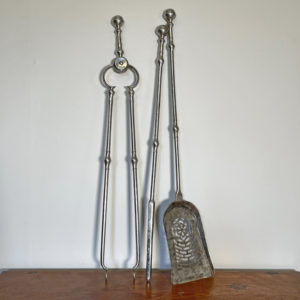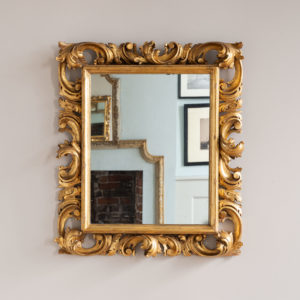546 items found
Page 2 of 6
-
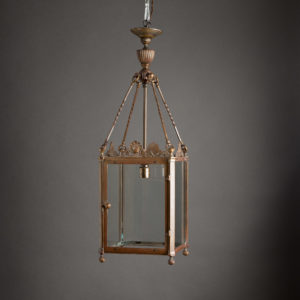
Nineteenth century patinated brass hall lantern
£2,200Nineteenth century patinated brass hall lantern
glazed and with single internal light fitment, each side with scallop shell and foliate cresting. Re-wired£2,200 -
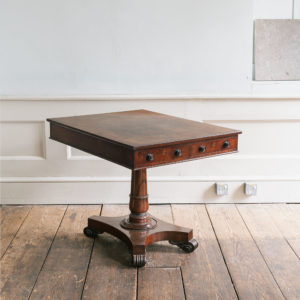
Nineteenth century Sabicu library table
£2,200Nineteenth century Sabicu library table
of unusual configuration and size, with oppositing drawers to the short sides of the rectangular top, the tapered and turned column with decorative band moulding supported by quatreform base, the scroll feet with castors.£2,200 -
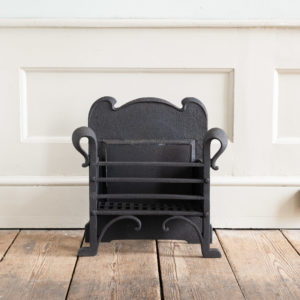
Small Art Nouveau cast iron fire basket
£2,200 -
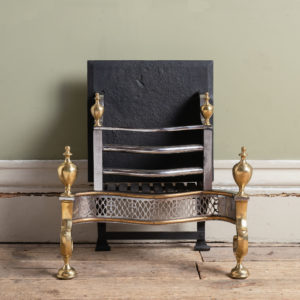
Victorian brass, iron and steel firegrate,
£2,200Victorian brass, iron and steel firegrate,
with polished steel fret-cut apron, scrolled standards and bold urn finials. Restored.£2,200 -
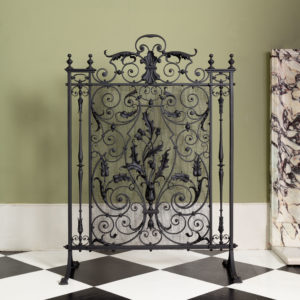
Fine and intricately worked wrought iron fire screen
£2,200Fine and intricately worked wrought iron fire screen
Scottish, in the manner of Sir Robert Lorimer, the central decorative panel with repeating scrolls interwoven with foliage and thistles backed by mesh.£2,200 -
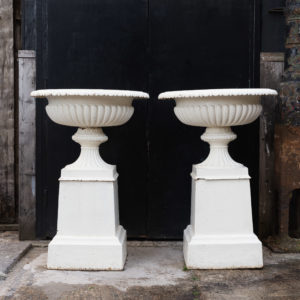
Pair of antique cast iron Campana urns on plinths,
£2,000 the pair -
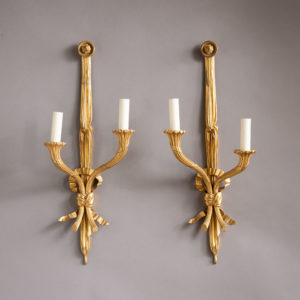
Pair of French gilt brass wall lights,
£2,000 the pairPair of French gilt brass wall lights,
with tied ribbon wall mounts and naturalistic sconces, re-wired and PAT tested£2,000 the pair -
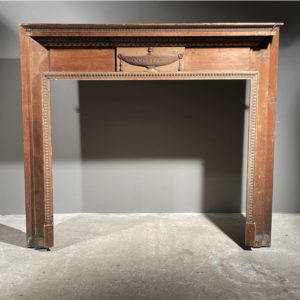
An Edwardian carved pine fire surround,
£1,875An Edwardian carved pine fire surround,
the rectangular shelf above a plain frieze centred by a tablet applied with a beautifully carved tazza in relief, raised on eared jambs, the whole boxed-out with later deep returns,£1,875 -
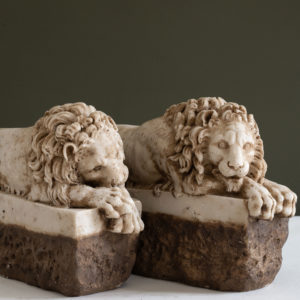
Pair of Grand Tour carved alabaster sleeping lions
£1,850 -
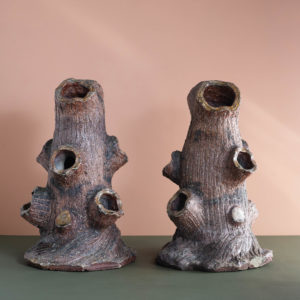
Pair of Victorian salt glazed terracotta faux-bois strawberry planters,
£1,850 the pairPair of Victorian salt glazed terracotta faux-bois strawberry planters,
each naturalistically modelled as tree trunks.£1,850 the pair -
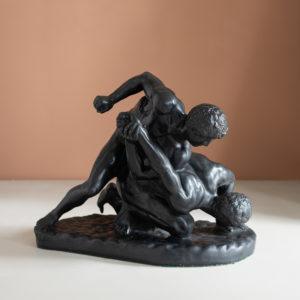
Nineteenth century bronzed plaster cast of ‘The Uffizi Wrestlers’,
£1,800Nineteenth century bronzed plaster cast of ‘The Uffizi Wrestlers’,
A Nineteenth century bronzed plaster sculptural copy of the Uffizi Wrestlers. Two young men are shown engaged in the pankration, a formed of Greek combat sport incorporating boxing, kickboxing and wrestling. The upper wrestler has his left leg entwined with his opponent's left leg, and his body across his opponent's body, twisting his opponent's right arm up£1,800 -
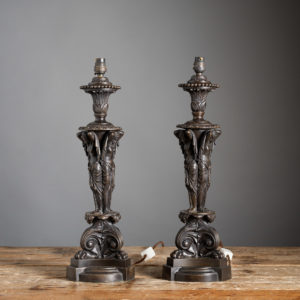
Pair of nineteenth century bronze table lamps,
£1,800 the pair -
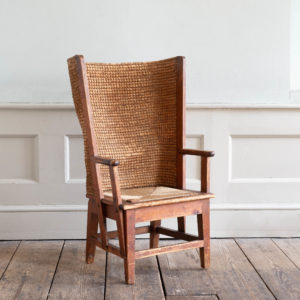
Liberty’s Arts and Crafts ‘Stronza’ Orkney Chair
£1,750Liberty’s Arts and Crafts ‘Stronza’ Orkney Chair
pine, seagrass and rush, Scottish c.1900, previously owned by film director (Victor) Gareth Gundry.£1,750 -
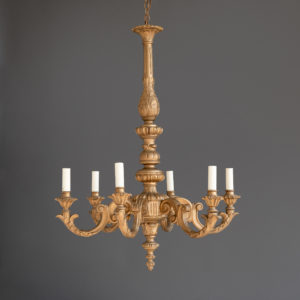
Italian giltwood chandelier
£1,750Italian giltwood chandelier
six light, re-wired and PAT tested, c.1920s and later refinished.£1,750 -
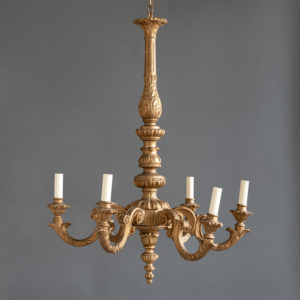
Italian giltwood chandelier,
£1,750Italian giltwood chandelier,
six light, re-wired and PAT tested, c.1920s and later refinished.£1,750 -
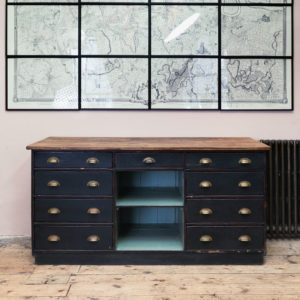
Edwardian shop counter
£1,750Edwardian shop counter
with iroko top and brass cup handles to the drawers. Previously re-painted.£1,750 -
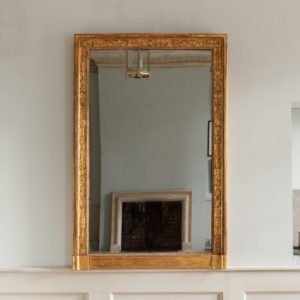
Nineteenth century gilt composition mirror
£1,750 -
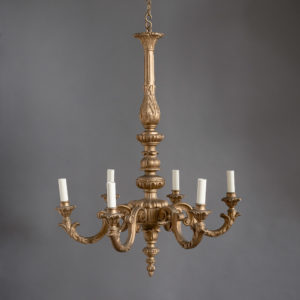
Italian giltwood chandelier
£1,750Italian giltwood chandelier
six light, re-wired and PAT tested, c.1920s and later refinished.£1,750 -
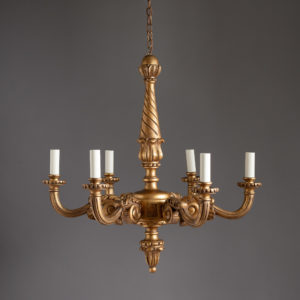
Giltwood chandelier
£1,750 -
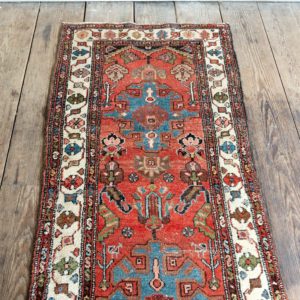
Persian Hamadan runner
£1,750 -
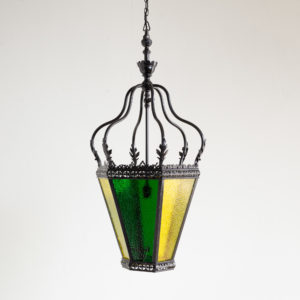
Nineteenth century converted gas lantern,
£1,750Nineteenth century converted gas lantern,
with gothic fretwork banding above and below the tapered body. Now wired for electricity.£1,750 -
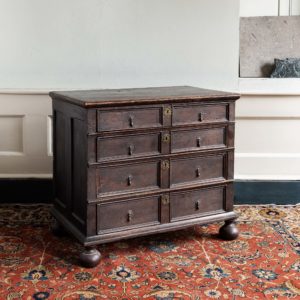
Charles II oak chest of drawers,
£1,750Charles II oak chest of drawers,
with four graduated drawers, on turned bun feet. Good dry surface, the handles correct but later replacements.£1,750 -
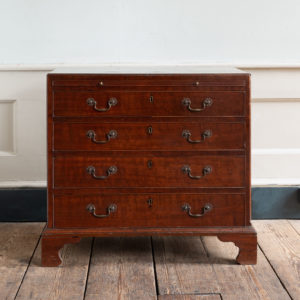
Eighteenth century mahogany chest of drawers,
£1,750Eighteenth century mahogany chest of drawers,
attractively patinated and of typical form, with brushing slide above four graduated drawers with original swan's-neck brasses, on bracket feet. Provenance: Farmleigh House, Ireland£1,750 -
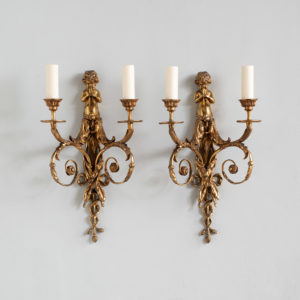
Pair of gilt bronze wall sconces,
£1,650 the pair -
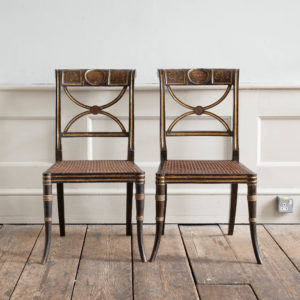
Pair of Regency faux-rosewood and parcel-gilt side chairs,
£1,600Pair of Regency faux-rosewood and parcel-gilt side chairs,
the top rails with charming and naïve painted lion portraits flanked by anthemion, the seats caned.£1,600 -
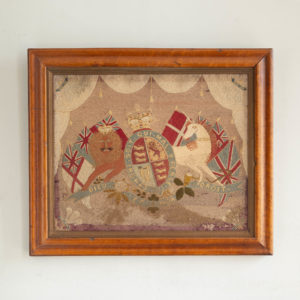
Victorian Embroidered Royal Coat of Arms
£1,500Victorian Embroidered Royal Coat of Arms
19th century embroidered Coat of Arms presented in a maple frame with gilt slip.£1,500 -
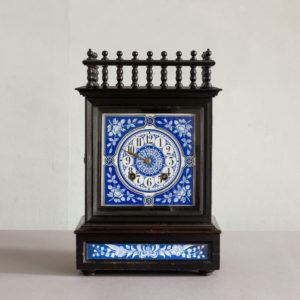
Striking mantel clock by Lewis Forman Day,
£1,500 -
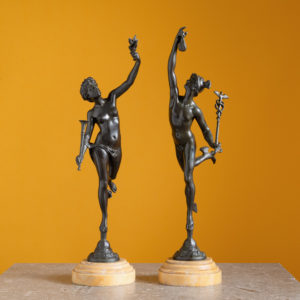
Pair of bronze statues Mercury and Fortuna,
£1,500 the pair -
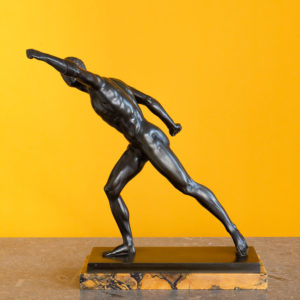
Nineteenth century bronze of the Borghese Gladiator
£1,500 -
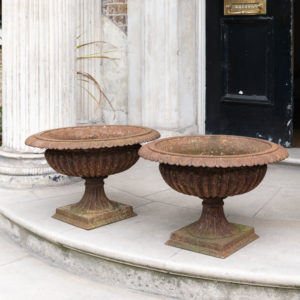
Pair of late nineteenth century French cast iron urns,
£1,500Pair of late nineteenth century French cast iron urns,
each having egg and dart rim above lobed bodies on fluted stem socles and raised square base,£1,500 -
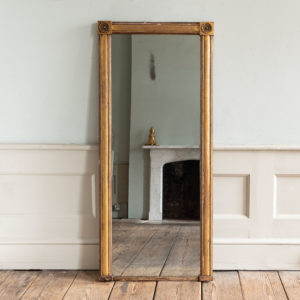
Giltwood pier mirror
£1,500Giltwood pier mirror
the cushion moulded frame with foliate bosses, the gilding pleasingly worn, with original plate-glass.£1,500 -
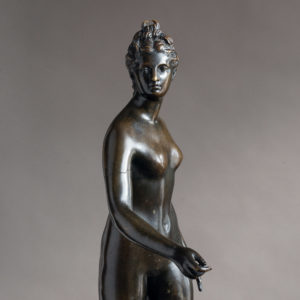
Bronze model of Diana the Huntress
£1,500Bronze model of Diana the Huntress
French c.1900, after the original by Jean-Antoine Houdon (1741-1828)£1,500 -
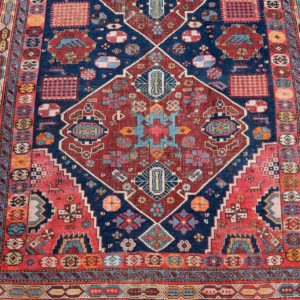
Caucasian Kazak rug
£1,450Caucasian Kazak rug
a charming design made by nomadic tribesmen, small areas of restoration, cleaned and ready to lay.£1,450 -
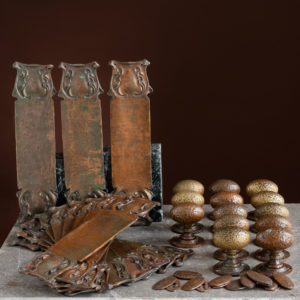
Set of late Victorian door furniture,
£1,450Set of late Victorian door furniture,
consisting of thirteen knobs, thirteen fingerplates, and nine escutcheons. Dimensions: Door knobs: 7.5 cm high x 6 cm wide, Fingerplates: 32 cm high x 8.5 cm wide x 0.5 cm deep Escutcheons: 4.8 cm high x 2.5 cm wide x 0.5 cm deep£1,450 -
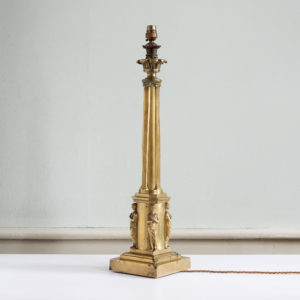
English nineteenth century gilt-bronze lamp base
£1,450English nineteenth century gilt-bronze lamp base
the tapered columnar shaft with four pilasters, the pedestal with female statues to each corner, on plinth base. Re-wired and PAT tested.£1,450 -
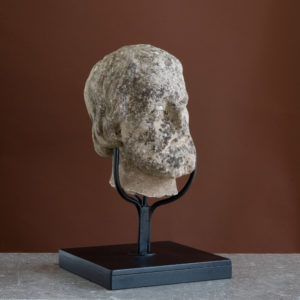
Weathered carved English Stone Head
£1,300Weathered carved English Stone Head
A worn and weatherbeaten sculpted stone head, possibly belonging to St Peter and likely Mid Ninteenth Century. Reputedly salvaged from the ruins of the 11th Century Church of St Mary and the Holy Rood at Little Chart in Kent. St Mary's Church was destroyed by a Flying Bomb on the 16th of August 1944 and later deconsecrated, with the parish reconstructed in neighbouring Great Chart£1,300 -
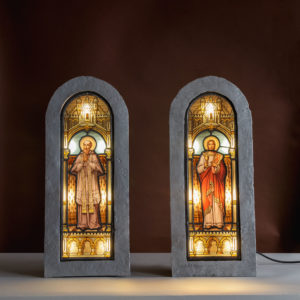
Pair of late Nineteenth century stained and painted glass panels.
£1,250 the pairPair of late Nineteenth century stained and painted glass panels.
Each panel having a hammered metal framed light box, one depicts the Saint John the Evangelist, with the bible in one hand and communion chalice in the other. The second panel depicts Saint Augustine, the Bishop of Hippo, in his characteristic purple robes, many consider him to be one of the most influential thinkers in the ancient western church.£1,250 the pair -
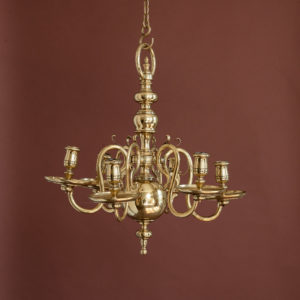
Nineteenth century brass candle chandelier,
£1,200Nineteenth century brass candle chandelier,
in the Flemish taste, six light with each arm pinned, generously cast through.£1,200 -

Eagle Wharf, Whistler
£1,200Eagle Wharf, Whistler
A framed black-line etching by the American artist and engraver James MacNeil Whistler showing shipping off Eagle Wharf off Wapping in the Pool of London. Taken from 'A Series of Sixteen Etchings of Scenes on the Thames and Other Subjects', otherwise referred to as The Thames Set, the pictures were created over a period of 12 years starting in 1859 and finally published as a complete set by Ellis & Green in London in 1871.£1,200 -
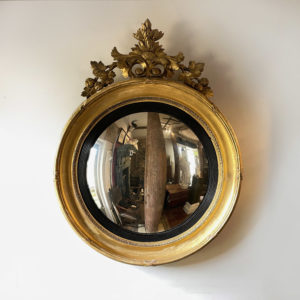
An early nineteenth century giltwood convex wall mirror,
£1,200An early nineteenth century giltwood convex wall mirror,
the convex plate within reeded ebonised sight and cavetto mould gilt-pine frame, ribbon tied to edge, with carved foliate crest; the gilding thin with old wear down to the gesso ground,£1,200 -

The Dance, by Henri Matisse, Jan – March 1939 / No. 4.
£1,200The Dance, by Henri Matisse, Jan – March 1939 / No. 4.
The Verve Review was a purposefully luxurious. It ran from 1937 to 1960, but with only 38 editions available, due to the high degree of design and editorial work dedicated to each issue. Each edition contained unique lithographic prints, commissioned by the editor, and each cover a double-page lithograph elaborated by one of the artists contained within. It was the brainchild of its editor Stratis Eleftheriades, a Greek National who moved to Paris in the early thirties to take part in the growing Modernist movement, writing under the name of Teriade.£1,200 -
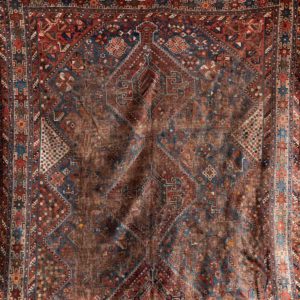
Antique Persian carpet,
£1,200Antique Persian carpet,
with worn and faded rust and blue ground, with start motif to the border. Cleaned and ready to lay.£1,200 -
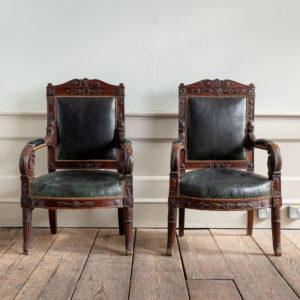
Matched pair of French Empire side chairs,
£1,200Matched pair of French Empire side chairs,
The dark stained soft wood framed side chairs, each having a central anthemion design to top rail, flanked by horizonal volutes, one chair has wreath details the other with flower designs. The flower heads and stylized anthemion motifs continue to the s-c scroll padded arms that issue from the stuffed leather backs. The stuffed ample leather seat with shaped and carved aprons, supported on sabre back legs and carved legs to the front. French circa 1810.£1,200 -
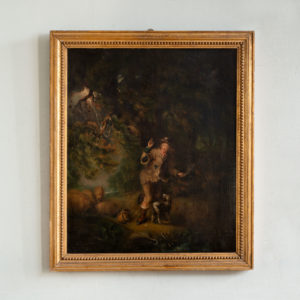
The Startled Shepherd, Robert Mendham
£1,200The Startled Shepherd, Robert Mendham
A genre painting of a shepherd and his faithful dog being startled by a bolt of lightinging in the woods. Attributed to the painter and portraitist Robert Mendham of Suffolk and London. Oil on Canvas, early 19th Century.£1,200 -
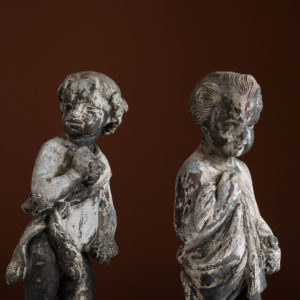
Pair of lead putti Summer and Autumn
£1,150Pair of lead putti Summer and Autumn
the pair of lead allegorical putti figures representing Summer and Autumn, Summer with flowers in its hand, Autumn with grapes. late nineteenth century Autumn is 66.5 cm high, Summer is 65 cm tall£1,150 -
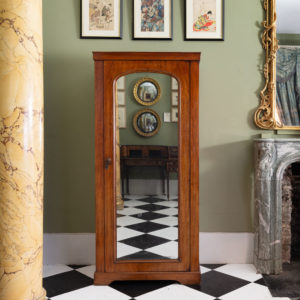
Victorian ‘Heal & Son’ figured mahogany wardrobe
£1,150Victorian ‘Heal & Son’ figured mahogany wardrobe
the door with its original arched plate glass mirror, the interior fitted with hanging rail, the drawer stamped 'HEAL & SON LONDON'. A good clean example suitable for regular use.£1,150 -
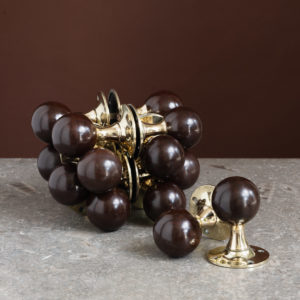
Set of early twentieth century door knobs,
£1,150 the setSet of early twentieth century door knobs,
bakelite and brass, nine pairs to the set.£1,150 the set -
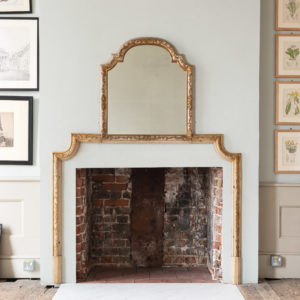
Nineteenth century parcel-gilt fireplace surround and mirror,
£1,100Nineteenth century parcel-gilt fireplace surround and mirror,
carved pine, requires marble interior.£1,100 -
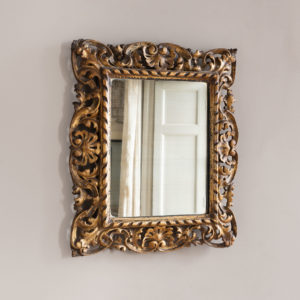
Florentine giltwood and gesso wall mirror,
£1,100 -
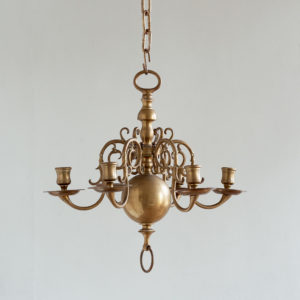
Nineteenth century brass candle chandelier, in the Flemish taste
£975Nineteenth century brass candle chandelier, in the Flemish taste
Surmounted by an oval ring, leading to shaped baluster stem, issuing six pinned branches, each terminating with circular drip pans and shaped candle holders. A large sphere to base terminating with ring finial. Please note the chandelier isn't electrified.£975 -
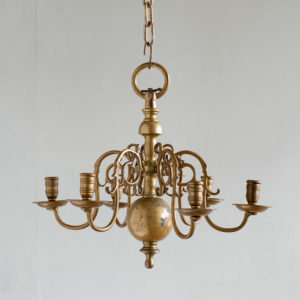
Nineteenth century brass candle chandelier, in the Flemish taste.
£950Nineteenth century brass candle chandelier, in the Flemish taste.
Having large loop to top above baluster stem issuing six s-c scroll branches, terminating with circular drip pans and shaped candle holders. Please note this chandelier is not electrified.£950 -
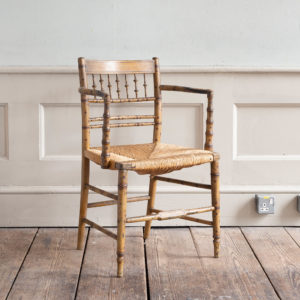
Regency faux bamboo armchair,
£950 -
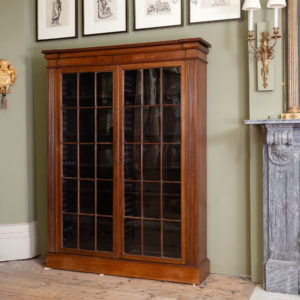
Nineteenth century mahogany cabinet,
£950Nineteenth century mahogany cabinet,
with reeded cornice and pulvinated frieze above glazed doors flanked by reeded pilasters, the ebonised interior with adjustable shelves.£950 -
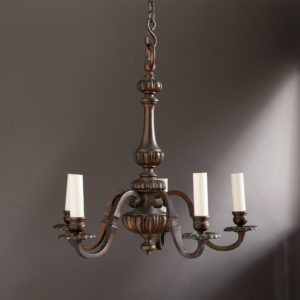
Small gadrooned chandelier,
£950Small gadrooned chandelier,
patinated brass/bronze with remnant of an old bronze paint finish, well cast and likely early twentieth century, in the seventeenth century style£950 -
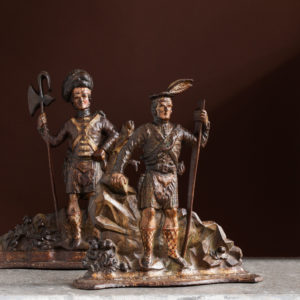
Pair of nineteenth century iron door porters
£950 the pairPair of nineteenth century iron door porters
depicting a pair of Scottish soldiers in their regimental livery, in their original paint.£950 the pair -
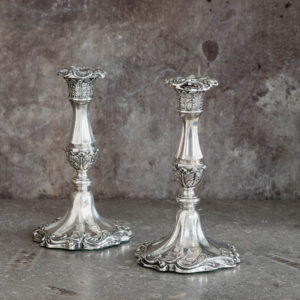
Pair Of William IV Silver Candlesticks.
£950Pair Of William IV Silver Candlesticks.
The baluster shaped candlesticks, with detachable candle drip pans formed of leaf and scroll designs, above a capital section of lengthen palm leaf detail, leading to an inverted tapered section, further leaf decoration on a splayed fanned base incorporating leaf scrolls and stylised flower heads. Minor damage to both candlesticks. One candlestick hallmarked Henry Wilkinson & Co, Sheffield 1837. The other hallmarked Henry Wilkinson & Co, Sheffield 1838.£950 -
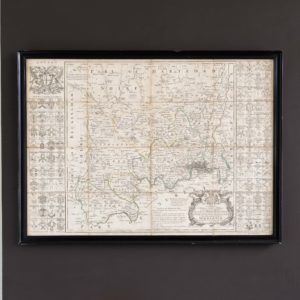
Middlesex by R.W. Seale, c1760
£950Middlesex by R.W. Seale, c1760
Title: 'To the Most Noble / Thomas Holles Pelham / Duke of NEWCASTLE. / Lord Lieutenant of Middlesex & Westminster, His Majesty's / Principal Secretary of State, Chancellor of the University / of Cambridge, & Knight of the Most Noble Order of y e GARTER. / This MAP of the COUNTY of MIDDLESEX / is Dedicated by his grace's most humble Servant / R.W. Seale.£950 -
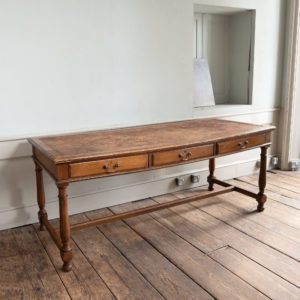
1920s oak table
£9501920s oak table
showing significant signs of wear and lacking leather skiver, with three frieze drawers, the baluster legs united by stretcher.£950 -
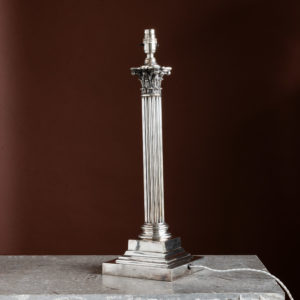
Large Edwardian silver plate Corinthian column table lamp,
£950Large Edwardian silver plate Corinthian column table lamp,
The well cast Corinthian capital above a fluted column on a stepped foot, GS stamped to the front edge. Circa 1905.£950 -
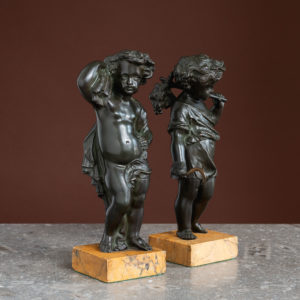
Pair of nineteenth century bronze figures of Harvest and Plenty,
£950 -
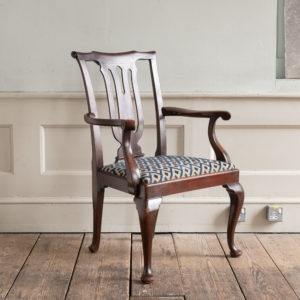
George II style elbow chair
£950George II style elbow chair
the well-drawn, dense mahogany frame with generous drop-in seat upholstered in cut velvet fabric by Pierre Frey.£950 -
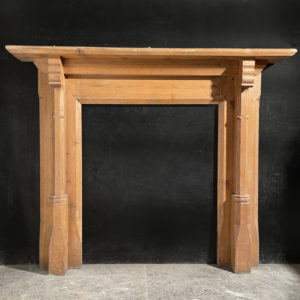
A Victorian pine chapel fire surround,
£925A Victorian pine chapel fire surround,
the rectangular shelf with chamfered moulding above the gothic inspired lobed corbels and the plain frieze and jambs with stop-chamfered details,
£925 -
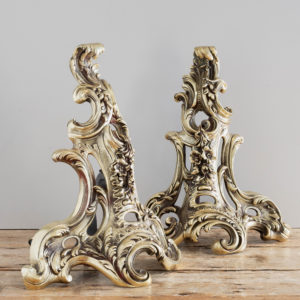
Pair of French nineteenth century chenets,
£900Pair of French nineteenth century chenets,
exceptionally cast and chased brass, with wrought iron stand to the rear.£900 -
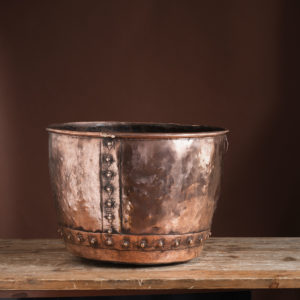
A Good Late Nineteenth Century Riveted copper log bin,
£900A Good Late Nineteenth Century Riveted copper log bin,
Having a hand hammered rim leading to a pair of riveted side panels, riveted to shaped base, the colour and size are very pleasing.£900 -
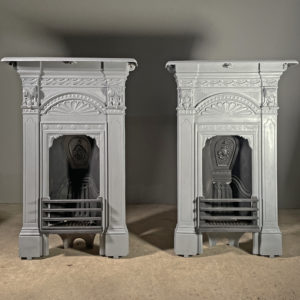
A pair of late Victorian cast iron combination grates
£895A pair of late Victorian cast iron combination grates
each with an integral rectangular moulded shelf above a frieze modelled in relief with a central demi-lune, relief cast spandrels above the railed basket; blasted, blacked to the fire interior and undercoated with fireproof paint,£895 -
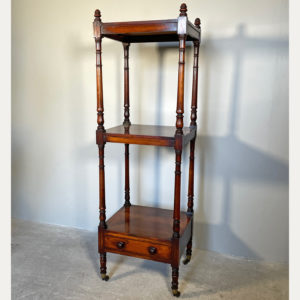
A George IV rosewood whatnot,
£880A George IV rosewood whatnot,
three tiers with drawer to lowest, raised on knopped uprights with acorn type finials and original brass castors; minor wear commensurate with age,£880 -
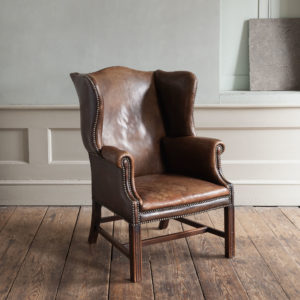
Brown leather wingback armchair,
£875 -
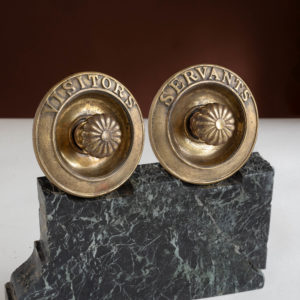
Pair of nineteenth century gilt-brass bell pulls,
£850 the pair -
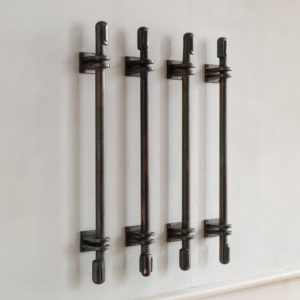
Large Art Deco bronze door pulls,
£800 the pairLarge Art Deco bronze door pulls,
The pulls with scroll detail to top and bottom held in place with shaped brackets each with four screw fixing points. sold as a pair, two pairs available, see stock no. 79326 B£800 the pair -

Large Art Deco bronze door pulls,
£800 the pairLarge Art Deco bronze door pulls,
The pulls with scroll detail to top and bottom held in place with shaped brackets each with four screw fixing points. sold as a pair, two pairs available, see stock no. 79326 A£800 the pair -
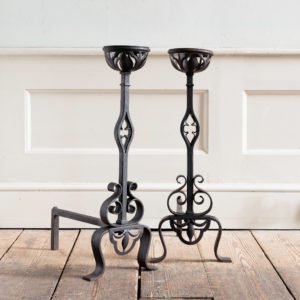
Pair of wrought iron andirons, in the Gothic taste
£800Pair of wrought iron andirons, in the Gothic taste
The pierced fret work mead cup holders, above a square bar support section centred by quatrefoil gothic design leading to s-c scrolls supported on scroll feet with further pierced fret work decorated apron, L shaped support behind.£800 -
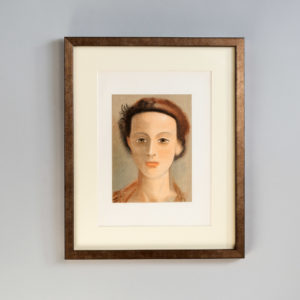
Portrait by Andre Derain, Verve Vol 2 / No. 5-6.
£800Portrait by Andre Derain, Verve Vol 2 / No. 5-6.
The Verve Review was a purposefully luxurious. It ran from 1937 to 1960, but with only 38 editions available, due to the high degree of design and editorial work dedicated to each issue. Each edition contained unique lithographic prints, commissioned by the editor, and each cover a double-page lithograph elaborated by one of the artists contained within. It was the brainchild of its editor Stratis Eleftheriades, a Greek National who moved to Paris in the early thirties to take part in the growing Modernist movement, writing under the name of Teriade.£800 -
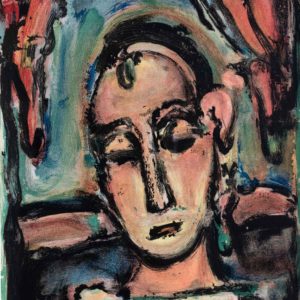
Head of a Girl by George Rouault, Verve Vol 2 / No. 5-6.
£800Head of a Girl by George Rouault, Verve Vol 2 / No. 5-6.
The Verve Review was a purposefully luxurious. It ran from 1937 to 1960, but with only 38 editions available, due to the high degree of design and editorial work dedicated to each issue. Each edition contained unique lithographic prints, commissioned by the editor, and each cover a double-page lithograph elaborated by one of the artists contained within. It was the brainchild of its editor Stratis Eleftheriades, a Greek National who moved to Paris in the early thirties to take part in the growing Modernist movement, writing under the name of Teriade.£800 -
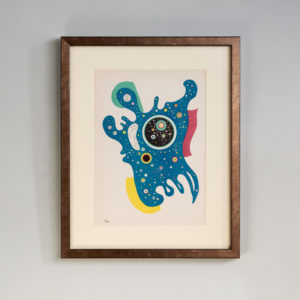
Stars by Wassily Kandinsky, Verve Vol. 1 / No. 2.
£800Stars by Wassily Kandinsky, Verve Vol. 1 / No. 2.
The Verve Review was a purposefully luxurious. It ran from 1937 to 1960, but with only 38 editions available, due to the high degree of design and editorial work dedicated to each issue. Each edition contained unique lithographic prints, commissioned by the editor, and each cover a double-page lithograph elaborated by one of the artists contained within. It was the brainchild of its editor Stratis Eleftheriades, a Greek National who moved to Paris in the early thirties to take part in the growing Modernist movement, writing under the name of Teriade.£800 -
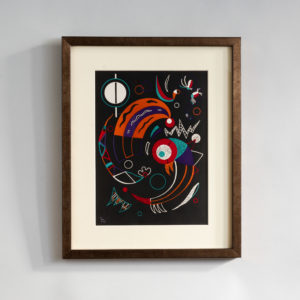
Comets by Wassily Kandinsky, Verve Vol. 1 / No. 2.
£800Comets by Wassily Kandinsky, Verve Vol. 1 / No. 2.
The Verve Review was a purposefully luxurious. It ran from 1937 to 1960, but with only 38 editions available, due to the high degree of design and editorial work dedicated to each issue. Each edition contained unique lithographic prints, commissioned by the editor, and each cover a double-page lithograph elaborated by one of the artists contained within. It was the brainchild of its editor Stratis Eleftheriades, a Greek National who moved to Paris in the early thirties to take part in the growing Modernist movement, writing under the name of Teriade.£800 -
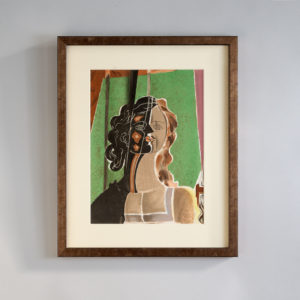
Figure by Georges Braque, Verve Vol 2 / No. 5-6.
£800Figure by Georges Braque, Verve Vol 2 / No. 5-6.
The Verve Review was a purposefully luxurious. It ran from 1937 to 1960, but with only 38 editions available, due to the high degree of design and editorial work dedicated to each issue. Each edition contained unique lithographic prints, commissioned by the editor, and each cover a double-page lithograph elaborated by one of the artists contained within. It was the brainchild of its editor Stratis Eleftheriades, a Greek National who moved to Paris in the early thirties to take part in the growing Modernist movement, writing under the name of Teriade.£800 -
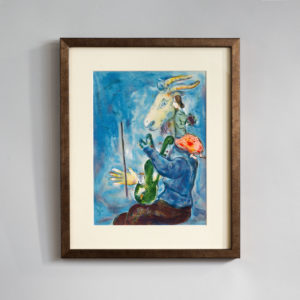
Printemps by Marc Chagall, Verve Vol. 1 / No. 3.
£800Printemps by Marc Chagall, Verve Vol. 1 / No. 3.
The Verve Review was a purposefully luxurious. It ran from 1937 to 1960, but with only 38 editions available, due to the high degree of design and editorial work dedicated to each issue. Each edition contained unique lithographic prints, commissioned by the editor, and each cover a double-page lithograph elaborated by one of the artists contained within. It was the brainchild of its editor Stratis Eleftheriades, a Greek National who moved to Paris in the early thirties to take part in the growing Modernist movement, writing under the name of Teriade.£800 -
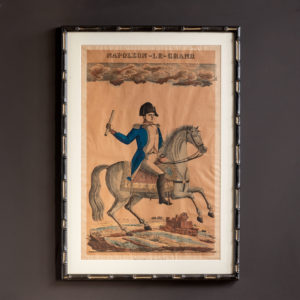
Napoleon-Le-Grand
£800Napoleon-Le-Grand
Jean-Charles Pellerin (1756 - 1836) was a French illustrator, artist, and printer. Born in Epinal, France.£800 -
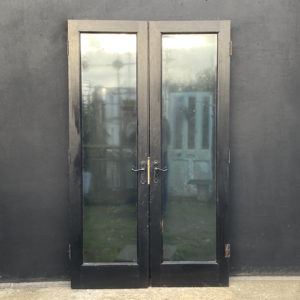
A pair of glazed oak doors
£780A pair of glazed oak doors
each rectangular frame with a large glazed panel, painted black to the obverse£780 -
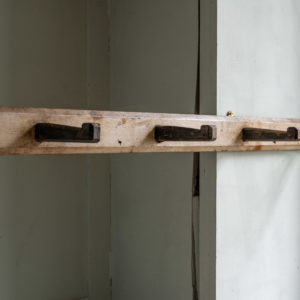
Vast set of painted pinewood coat pegs
£775 -
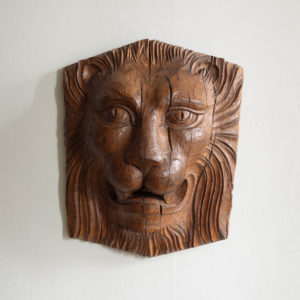
Large oak lion mask,
£775 -
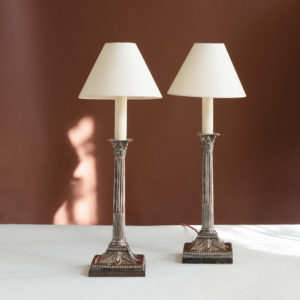
Pair of Edwardian silver plate lamps,
£750 the pairPair of Edwardian silver plate lamps,
with stop-fluted column shaft, re-wired. Another pair available, see stock #79564 A£750 the pair -
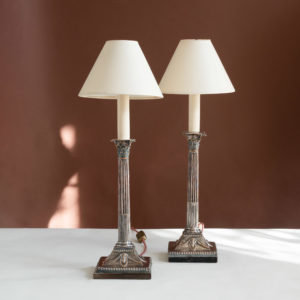
Pair of Edwardian silver plate lamps,
£750 the pairPair of Edwardian silver plate lamps,
with stop-fluted column shaft, re-wired. Another pair available, see stock #79564 B£750 the pair -
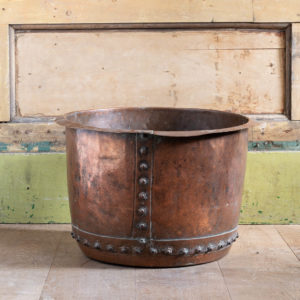
Riveted copper vat
£750 -
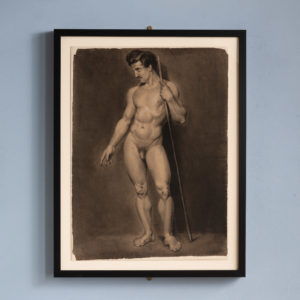
Early nineteenth century nude study,
£750Early nineteenth century nude study,
An early nineteenth century framed charcoal life-study of a male figure. The figure is shown heroically nude, from the front, in a full length, slightly serpentina pose with the right arm radiating from the torso. The composition is depicted contraposto and leaning on a spear or staff. The pose depicted is shows a slightly adapted and altered rendering of the famous Doryphorus, or Spear-Barer of Polykleitos. Polykleitos was known as the best sculptor of men in the ancient world, with the primary subjects of his works being male athletes with idealised body proportions. He was interested most chiefly in the mathematical proportions of the human form, which led him to write an essay the famous Kanon, on the proportions of humans. The Doryphoros is an illustration of his writings in Kanon on the symmetry between the body parts£750 -
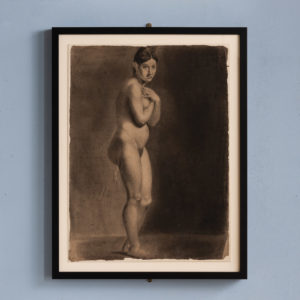
Early nineteenth century nude study,
£750Early nineteenth century nude study,
An early nineteenth century framed charcoal life-study of a female figure. The figure, shown side-on, models the Pudica pose, an affected posture of chaste virtue, inherited from classical art.£750 -
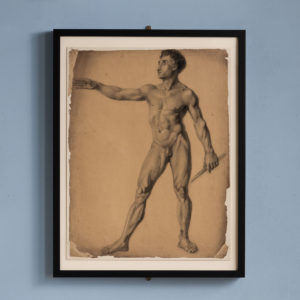
Early nineteenth century nude study,
£750Early nineteenth century nude study,
An early nineteenth century framed charcoal life-study of a male figure. The figure is shown heroically nude, from the front, in a full length, adlocutio pose, contraposto and grasping a shaft or baton. The pose is a famous one in Classical Art, said to embody power, control and leadership, and its most famous example is the Augusto di Prima Porta in the Vatican Museums in Rome.£750 -
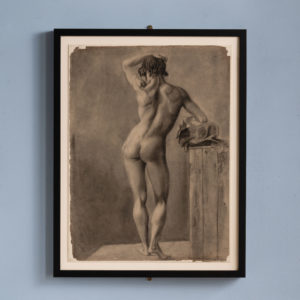
Early nineteenth century nude study,
£750Early nineteenth century nude study,
An early nineteenth century framed charcoal life-study of a male figure. The figure is shown from behind in full length, contraposto, with developed musculature and a sinuous, dramatic, figura serpentina recollecting the Dancing Faun of the Uffizi, and the famous Farnese Hercules.£750 -
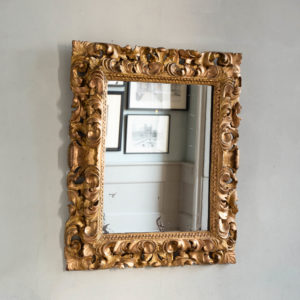
Nineteenth century Florentine giltwood mirror
£750Nineteenth century Florentine giltwood mirror
the frame composed of scrolling acanthus, with later plate-glass£750 -
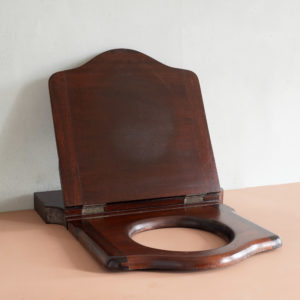
Reclaimed mahogany lavatory seat,
£750 -
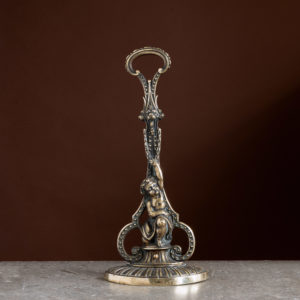
Large Victorian Cherub and lion brass door porter,
£750Large Victorian Cherub and lion brass door porter,
stamped 'WTS' to the rear, along with diamond registration mark.£750 -
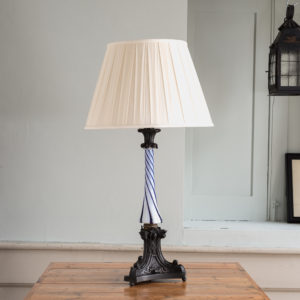
Victorian brass and glass lamp base
£750Victorian brass and glass lamp base
the opaline glass shaft with spiral twist blue line decoration, re-wired and PAT tested. Sold without shade.£750 -
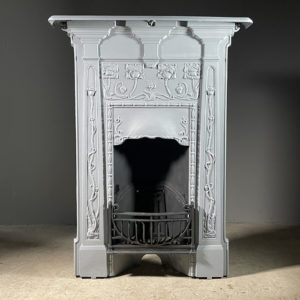
An Art Nouveau cast iron combination grate
£725An Art Nouveau cast iron combination grate
the integral rectangular moulded shelf above a frieze modelled in relief with four stylised flowers ranked above meandering stalks and a pierced bar front, blasted, blacked to the fire interior and undercoated with fireproof paint,£725 -
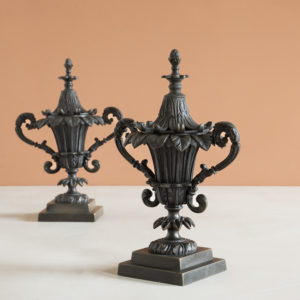
Pair of Regency bronze pastille burners
£700 the pairPair of Regency bronze pastille burners
The pair of pastille burners are well cast decorative pieces, each having lids made up of inverted leaves attached to a rim with stylised pineapple finial, leading to a campana shaped urn with further leaf detail to rim, flanked by s-c scroll handles all raised on the detailed stem on a square stepped base. Early nineteenth century. Pastille burners were popular from the 1600, the pastilles were burnt to make rooms and areas smell more pleasant. The pastille was a form of incense, often made from charcoal (Willow being preferred) along with saltpetre (potassium nitrate) and a fragrance such as rose, sandalwood or lavender.£700 the pair -
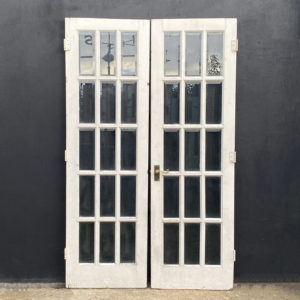
A pair of glazed hardwood french windows
£680A pair of glazed hardwood french windows
each leaf of the patio doors glazed with fifteen rectangular panes£680 -
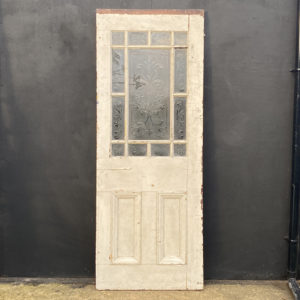
An English part-glazed pine door
£675An English part-glazed pine door
the central glazed panel with margins cut and etched with floral and foliate designs above the panelled lower section£675 -
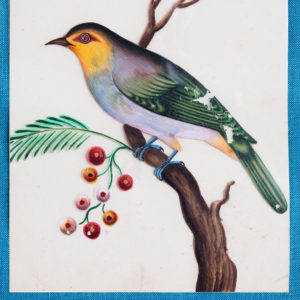
Set of Indian orthniological paintings on mica
£660 set of sixSet of Indian orthniological paintings on mica
Mica is a transparent mineral composed of complex mixtures of potassium silicates. The variety of mica used most frequently by these Indian artists is Muscovite (H2KAl3 Si04)3 which is found widely throughout south India. The mica is formed between strata of granite and the transparency of the material is a result of the heat and pressure created between the layers of rock during formation. Mica consists of many interlocking platelets, resulting in a laminar structure which can be split easily into thin sheets.£660 set of six
Featured Items
-
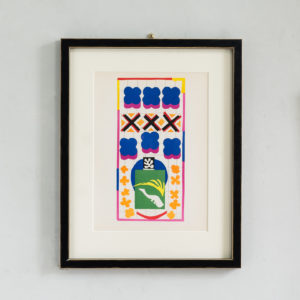
Henri Matisse, ‘The Last Works of Henri Matisse’
£900 eachHenri Matisse, ‘The Last Works of Henri Matisse’
From Verve Vol. IX No. 35/36 published by Tériade under the title 'The Last Works of Henri Matisse'£900 each -
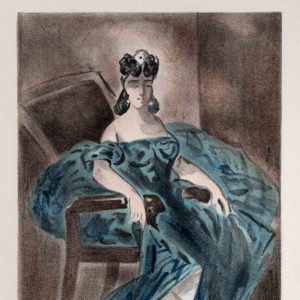
Portraits Part I by Constantin Guys, Verve Vol 2 / No. 5-6.
£500Portraits Part I by Constantin Guys, Verve Vol 2 / No. 5-6.
The Verve Review was a purposefully luxurious. It ran from 1937 to 1960, but with only 38 editions available, due to the high degree of design and editorial work dedicated to each issue. Each edition contained unique lithographic prints, commissioned by the editor, and each cover a double-page lithograph elaborated by one of the artists contained within. It was the brainchild of its editor Stratis Eleftheriades, a Greek National who moved to Paris in the early thirties to take part in the growing Modernist movement, writing under the name of Teriade.£500 -

Stars by Wassily Kandinsky, Verve Vol. 1 / No. 2.
£800Stars by Wassily Kandinsky, Verve Vol. 1 / No. 2.
The Verve Review was a purposefully luxurious. It ran from 1937 to 1960, but with only 38 editions available, due to the high degree of design and editorial work dedicated to each issue. Each edition contained unique lithographic prints, commissioned by the editor, and each cover a double-page lithograph elaborated by one of the artists contained within. It was the brainchild of its editor Stratis Eleftheriades, a Greek National who moved to Paris in the early thirties to take part in the growing Modernist movement, writing under the name of Teriade.£800 -
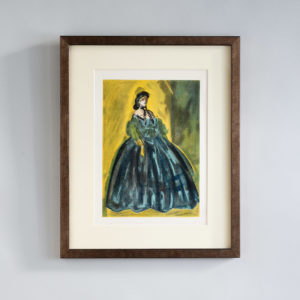
Portraits Part II by Constantin Guys, Verve Vol 2 / No. 5-6.
£500Portraits Part II by Constantin Guys, Verve Vol 2 / No. 5-6.
The Verve Review was a purposefully luxurious. It ran from 1937 to 1960, but with only 38 editions available, due to the high degree of design and editorial work dedicated to each issue. Each edition contained unique lithographic prints, commissioned by the editor, and each cover a double-page lithograph elaborated by one of the artists contained within. It was the brainchild of its editor Stratis Eleftheriades, a Greek National who moved to Paris in the early thirties to take part in the growing Modernist movement, writing under the name of Teriade.£500

